LGBTQI+
LGBTQI+

wild wild Wild West & Haunting of the Seahorse
wild wild Wild West / Haunting of the Seahorse by Jonathan Lyndon Chase, part of a new book series of experimental narratives. This release of non-linear storytelling illustrates black queer bodies moving through fluid states of love, grief, and desire within the canons of science fiction, fantasy and horror. Like a love letter, Jonathan employs multi-sensory entanglements, a blending of the abstract and physical, to draw out complex histories of blackness, meditations on mental health, and queer futurity.
Jonathan Lyndon Chase is an interdisciplinary artist principally working in modes of painting, video and sculpture depicting queer black love and community amid the backdrop of urban and domestic spaces. This is their second book with Capricious Publishing—a debut book Quiet Storm was released in conjunction with Company Gallery in 2018. Chase was born in 1989 in Philadelphia, PA where they currently live and work.

Mucus in my Pineal Gland
A 180+ page collection of poems and writings by artist and performer Juliana Huxtable. Co-published by Wonder.
Juliana Huxtable is a New York City-based writer, performer, and artist. Her work has been featured in numerous publications, including Artforum, Candy, Tropical Cream, and Mousse. She was included in the 2015 New Museum Triennial, curated by Ryan Trecartin and Lauren Cornell.

Randy 2010-2013
RANDY is a 300-plus page full color anthology of RANDY zines spanning 2010-2013. Initiated by artist A.K. Burns and publisher Sophie Mörner, RANDY was a fearless celebration of queer/feminist arts.
Contains over 100 interviews, conversations and projects including work by:
niv Acosta, Jess Arndt, Meriem Bennani, Sadie Benning, Elizabeth Bethea, Ramdasha Bikceem, Cass Bird, Dana Bishop-Root, Pauline Boudry, boychild, Kathe Burkhart, Nao Bustamante, Jibz Cameron, Silvia Casalino, Christelle de Castro, Leidy Churchman, Jon Davies, Hayden Dunham, Celeste Dupuy-Spencer, Nicole Eisenman, Edie Fake, Corrine Fitzpatrick, Daphne Fitzpatrick, Shannon Funchess, Mariah Garnett, Luke Gilford, Julia Gillard, Jules Gimbrone, Reina Gossett, Goodyn Green, Gordon Hall, Harmony Hammond, Onya Hogan-Finlay, Emily Hope, Katherine Hubbard, Amber Ibarreche, Mariana Juliano, Stanya Kahn, Sarah Forbes Keough, Pozsi B Kolor, Adam Krause, Lisa Lenarz, Katerina Llanes, Amos Mac, Lee Maida, India Salvor Menuez, Lessa Millet, MPA, Ulrike Müller, Sheila Pepe, Litia Perta, Cassie Peterson, Isaac Preiss, R.H Quaytman, Jen Rosenblit, Colin Self, Mel Shimkovitz, Amy Sillman, Tuesday Smillie, Jazmin Venus Soto, Matthew Stone, Ginger Brooks Takahashi, Lanka Tattersall, Wu Tsang, Scott Valentine, Leilah Weinraub, Hanna Wilde, Martha Wilson, Io Tillett Wright, Geo Wyeth, Yes! Association/Föreningen Ja!
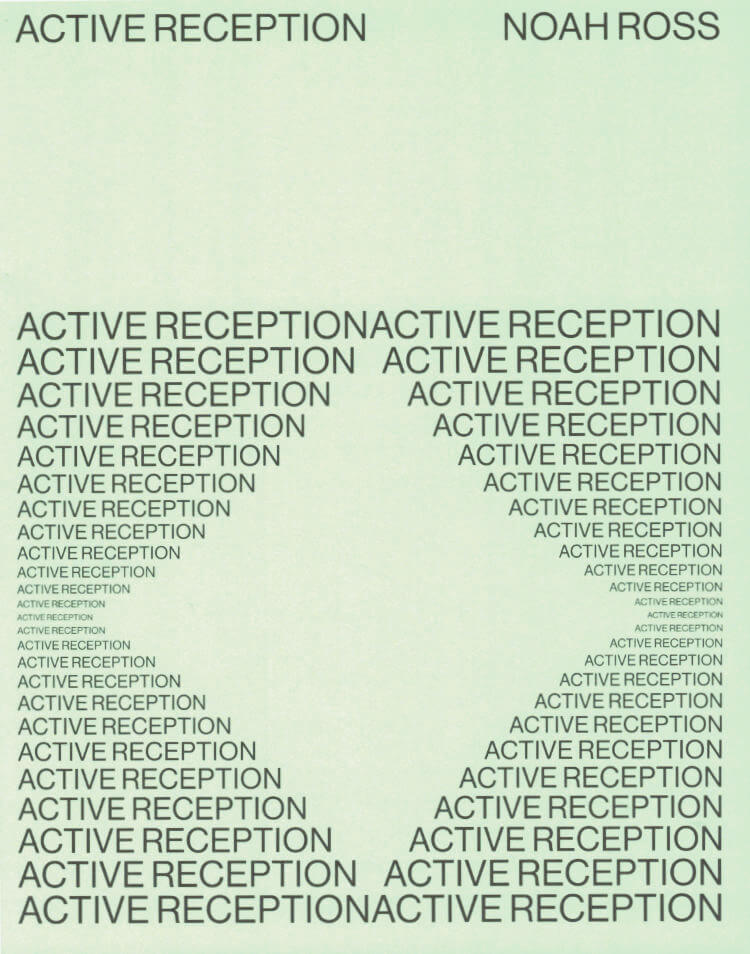
Active Reception
A vibrant work of lyric, conceptual, and confessional poetic modes pitched to enact a queer politics of liberation.
Active Reception is a book of bottoming lovers, the world around us, and a history of letters, that thinks through a queer mode of writing from the bottom, a kind of coalition based politics of receptivity and expansion that is open to the world around us, its myriad life forms, its systemic oppressions, its hidden ghosts.
Noah Ross is a bookseller, editor, and poet based in Berkeley, CA. Noah is the author of Swell, and an editor of Baest: a journal of queer forms & affects, and Mo0on/IO with Lindsay Choi.

Truant: Photographs 1970-1979
Throughout the 1970s, filmmaker Barbara Hammer toured the United States, Africa, and Europe, making film after film about women and the lesbian experience, both of which had seldom been seen by a woman, for women on screen before. She made a slew of now-legendary experimental films, including Sisters! (1973), Dyketactics (1974), Multiple Orgasm (1976), Sappho {1978), and Double Strength {1978), more or less inventing lesbian cinema at a time when such material had largely been relegated to the pornographic imagination of male artists and filmmakers. During this prolific period, Hammer photographed her travels, her lovers, moments of community and kinship between her collaborators on set, private and public performances, friends, strangers. Through these photographs, Hammer explodes traditional notions of female sexuality by showing it for what it is: complex, messy, abstract, human.
Barbara Hammer is an experimental filmmaker whose work has pioneered feminist and lesbian cinema for five decades. She has had film retrospectives at the Jeu de Palme (Paris), Museum of Modern Art (New York), Tate Modern (London), National Gallery of Art (Washington, Dq, Kunsthall (Oslo, Norway), Toronto Film Festival, and Pink Life Queer Festival (Ankara and Istanbul, Turkey). Her work was included in the 1985, 1989, and 1993 Whitney Biennials and is included in the permanent collections of the Australian Center for the Moving Image, the Museum of Modern Art (New York), the Centre Georges Pompidou, and elsewhere. She is the author of Hammer! Making Movies Out of Sex and life (Feminist Press 2009). An exhibition of her notebooks was presented at Company Gallery in Fall 2014. A follow-up exhibition at Company, Truant: Photographs, 1970 – 1979, featuring unseen photographs from the 1970s, opened in October 2017.

Randy Issue #3
Randy engages inter-generational dialogue as a means to examine multiple perspectives on queer identity and gender.
In bringing together under-represented voices in a collaborative discussion, Randy expands the politics of art, sexuality, and aesthetics. Intent on fostering un-trodden affiliations, Randy publishes both emerging and established artists and writers. Through printed content, special events and curated shows, Randy produces an urgently needed genealogy of international queer artists and thinkers alike.
Randy is the personal and nepotistic project of A.K. Burns and Sophie Morner. Initiated in late 2009, Clark Solack became co-editor in the fall of 2011.
Issue #3—Reina Gossett / Tuesday Smillie / Jen Rosenblit / Niv Acosta / Julia Gillard / Martha Wilson / Ramdasha Bikceem (Klub Kid Vintage) / Stanya Kahn / Emily Hope / Sadie Benning / Sarah Forbes Keough / Meriem Bennani / Cassie Peterson / Kathe Burkhart / Isaac Preiss / Clark Solack / Hanna Wilde / Melanie Bonajo
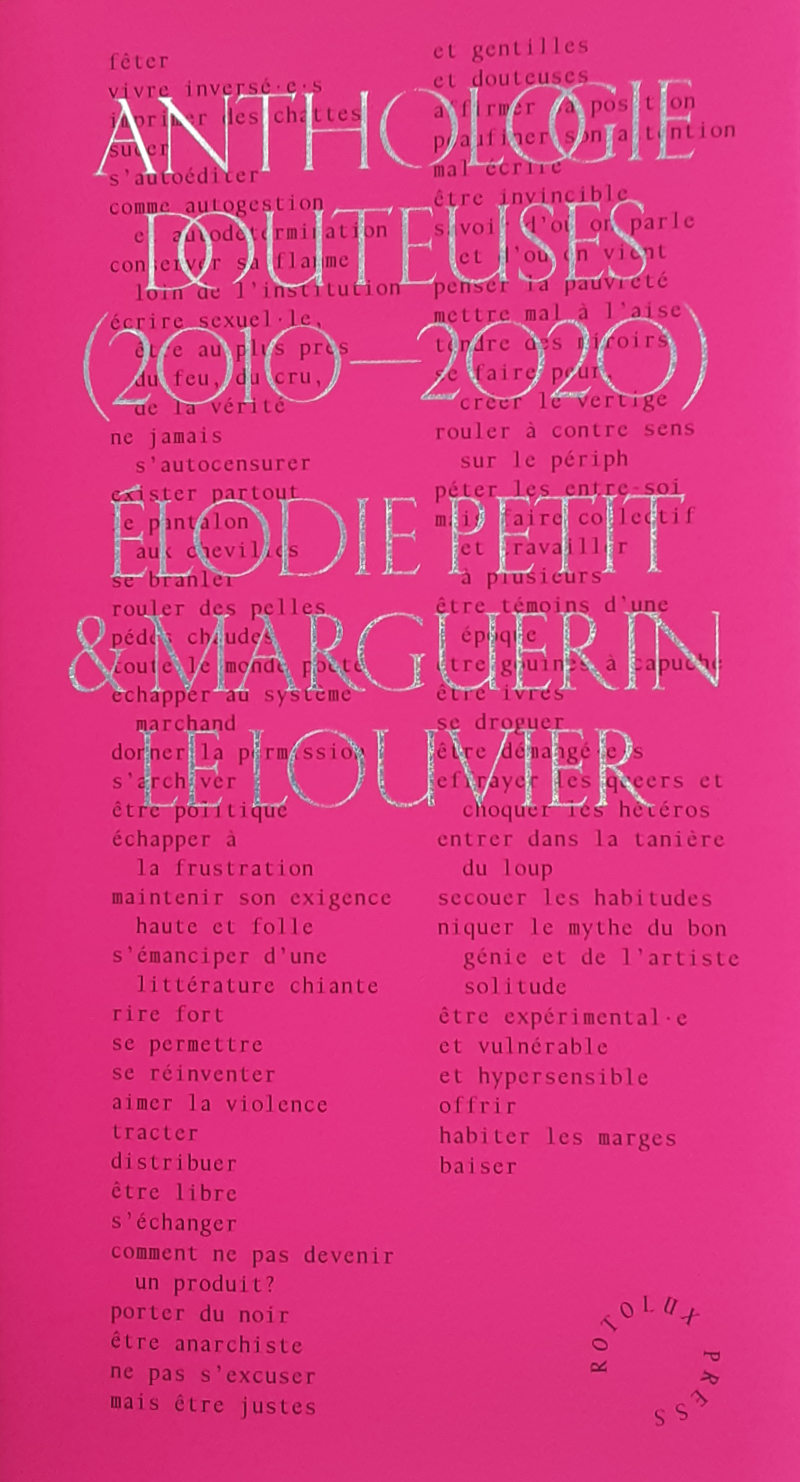
Anthologie Douteuses (2010—2020)
Élodie Petit, Marguerin Le Louvier
Élodie Petit et Marguerin Le Louvier écrivent des poèmes brûlants, sexuels, politiques et les autoéditent depuis leurs chambres sous la bannière commune des Éditions Douteuses. En une décennie, ils produiront des dizaines de textes courts et incisifs, imprimés en noir sur papiers colorés, parfois fluo, formats A5 ou A6 agrafés. À tirages variables, ils seront diffusés lors de soirées lectures-performances dans des bars ou des institutions artistiques, dans des salons de micro-éditions underground ou parfois sous le manteau. L’Anthologie Douteuses (2010—2020) rassemble pour la première fois ces textes en un seul volume, où l’arrangement chronologique donne à voir une certaine évolution de leur pratique littéraire sur dix ans.
« Des incendies savamment allumés au fuel de l’ironie, du fun et du détournement, de la critique sociale et sexuelle, de la pensée radicale et de la poésie merveilleuse. Des contre-feux révolutionnaires joyeusement embrasés par une gouine et un pédé mal repassés du col, qui écrivent, baisent, dessinent, dansent, et s’asseyent en gloussant sur le visage de tous les «culs cousus» et autres suceurs de vieux noyaux. (...) Oui, cette tendresse, leur tendresse, celle d’Élodie et de Marguerin, je crois, nous guérira de tout et leurs merveilleux textes, enfin réunis en un seul et même volume, il faudra les lire quand le courage de vivre, d’aimer et de faire la révolution viendra à nous manquer. Moi, c’est ce que je ferai. » Extrait de la préface d’Anne Pauly.
« Le feu, dans cet ouvrage, est partout invoqué, sussuré, explosé. Il se coule dans les pratiques poétiques queer, matérialistes et révolutionnaires des deux artisan·e·s de ce programme politique. Les éditions douteuses sont un mode d’emploi pour des alliances radicales trans-pédés-gouines-et-au-delà, un appel à une nécessaire profusion-collusion de nos appartenances, de nos situations, et à la production d’intervalles de revendications et de combats partagés. » Extrait de la préface de Thomas Conchou.

Reynaldo Rivera
Lauren Mackler, Hedi El Kholti
Throughout the 1980s and 1990s, Reynaldo Rivera took personal photos of the Los Angeles that he lived in and knew: a world of cheap rent, house parties, subversive fashion, underground bands, and a handful of Latino gay and transvestite bars: Mugi’s, The Silverlake Lounge, and La Plaza. Most of these bars are long closed and many of the performers have died. But in Rivera’s photographs, these men and women live on in a silvery landscape of makeshift old-style cinematic glamour, a fabulous flight from unacceptable reality.
As a teenager, Rivera took refuge in used bookstores and thrift stores, where he discovered old photo books of Mexican film stars and the work of Lisette Model, Brassai, and Bresson. Inspired, he bought a camera and began photographing people at his hotel. In 1981 he moved to Echo Park and began taking photos for the LA Weekly.
This book is an ensemble of almost 200 images selected by Hedi El Kholti and Lauren Mackler spanning more than two decades in Los Angeles and Mexico. The book also includes Luis Bauz’s story, “Tatiana,” about one of the subjects of these photographs; a critical essay on Rivera’s work by Chris Kraus; and a novella-length conversation between Rivera and his friend and contemporary Vaginal Davis about their lives, work, fantasies, and collective histories.
Edited by Hedi El Kholti and Lauren Mackler
With Luis Bauz, Vaginal Davis and Chris Kraus

Design Struggles - Intersecting Histories, Pedagogies, And Perspectives
This publication offers a critical assessment of the complicity of design in creating, perpetuating, and reinforcing social, political, and environmental problems, both today and in the past. It proposes going against the grain by problematising Western notions of design to foster situated, decolonial, and queer-feminist modes of disciplinary self-critique, and looks at design through the intersections of gender, culture, ethnicity, and class. Applying robust scholarly insight with engaging and accessible modes of conveyance and storytelling, an urgent and expansive array of voices and views emerge from those engaged in struggles with, against, or around the field of design.
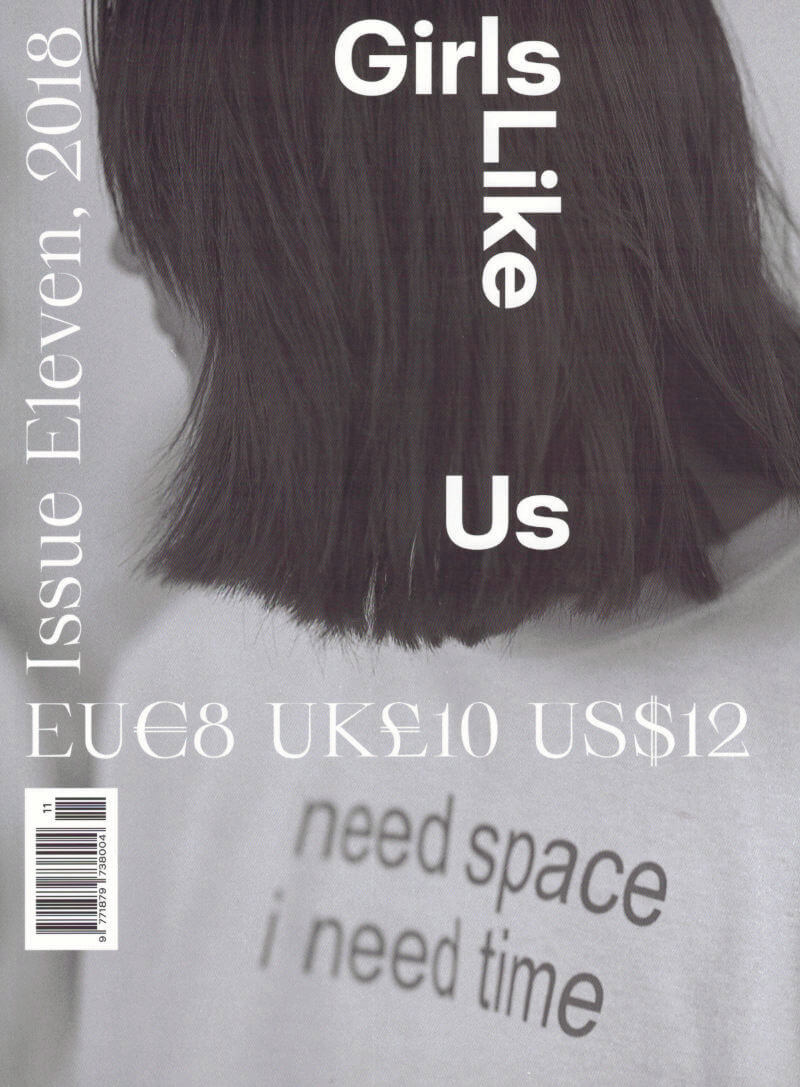
Girls Like Us #11 - Economy
Jessica Geysel, Sara Kaaman and 2 more
Framed as inescapable, indescribable, uncontrollable and essential, economies are everywhere. Oppressive and enabling, lucrative and undervalued, there are economies that trade our emotional labour, desires, love, fertility, time, minds, queerness, politics and clicks. There are economies that we can control and that control us, and those that we can subvert to serve our collectives. A mark, a yen, a buck or a pound, in a conversation with a cat, an app-enabled journey through a rainy Shanghai night, in the margins between intimacy and power, in the kitchen, with your record collection, under the tip of the iceberg, at the foot of a tower she built, dancing at the lesbian bar.

Girls Like Us #10 - Future
Jessica Geysel, Sara Kaaman and 2 more
We want a future outside of straight time. A future in which all our friends and lovers and their lovers are coming over for dinner around a table we built together. We want a future that is fair, fun, furry, fabulous, fierce, free and not fucked up. We want futures.
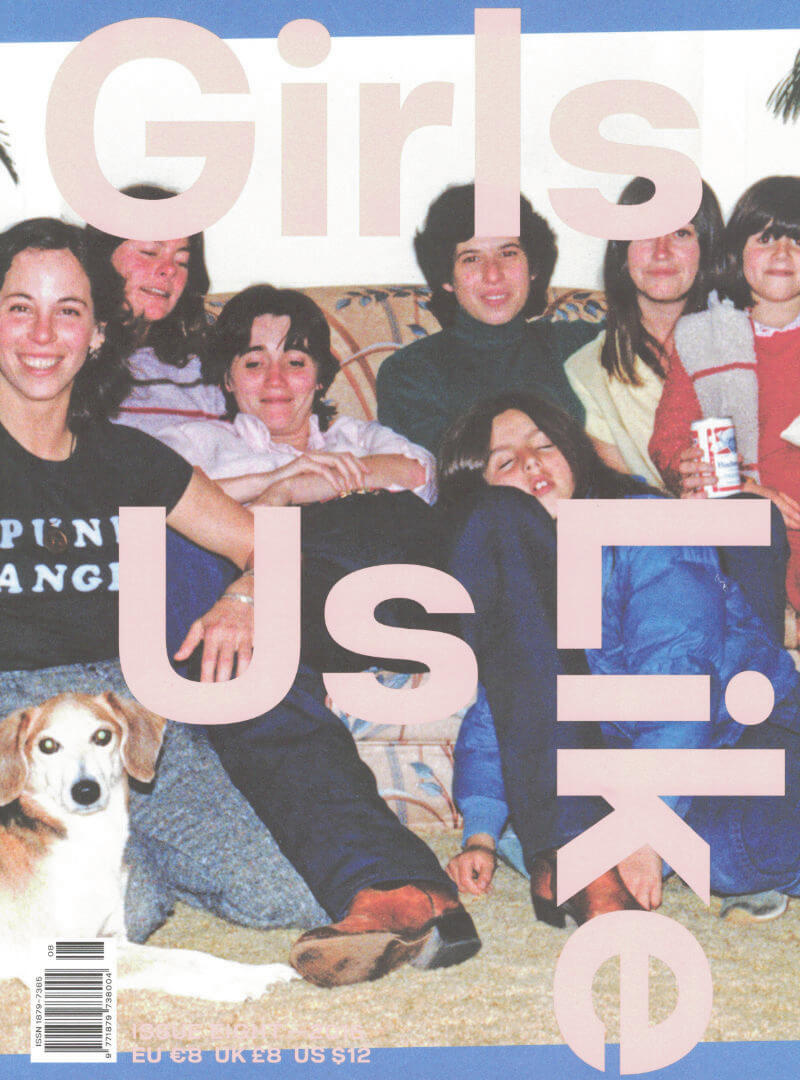
Girls Like Us #8 - Family
Jessica Geysel, Sara Kaaman and 2 more
Dear Lovers, Sisters, Brothers, Mothers, Adopted Aunts, Long Lost Fathers, Half-cousins, Wives, Black Sheep and Partners In Crime
As you know, we have a soft spot for collectives, collaborations, friendships and support structures. People doing things with other people: loving, working, organizing, living. These strategies for surviving together form an underlying thread throughout all our issues. This time we wanted to look more closely at one way of naming these friendly constellations: FAMILY.
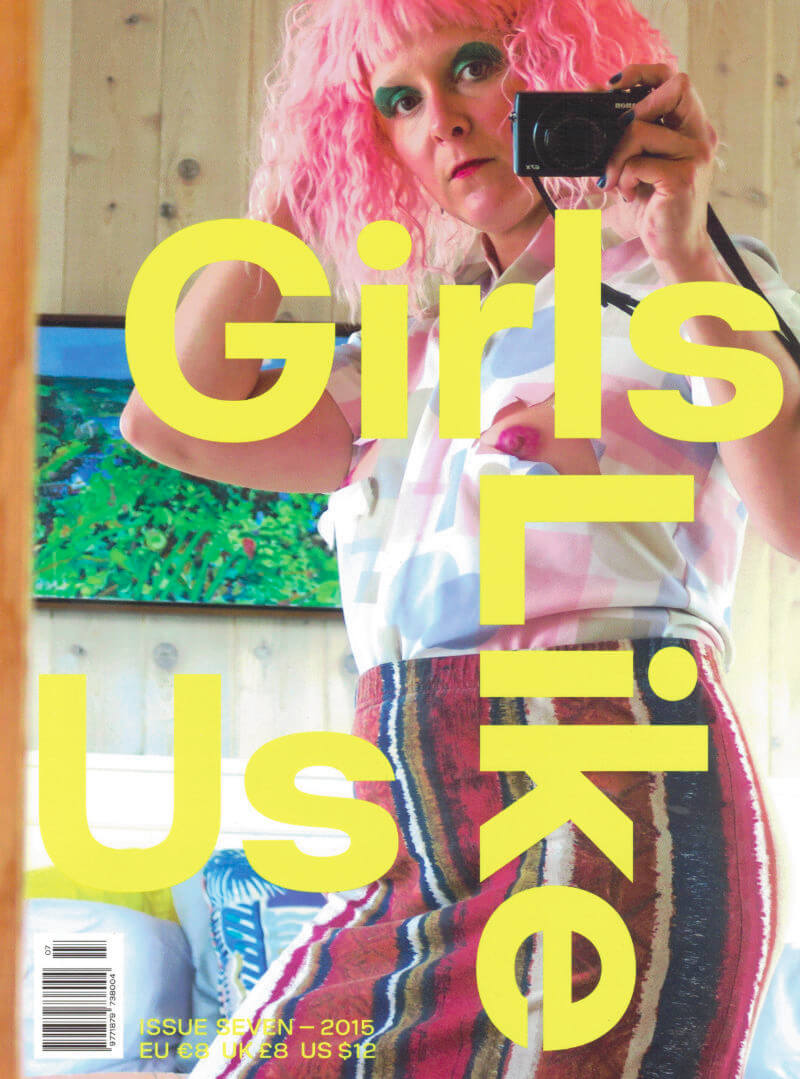
Girls Like Us #7 - Body
Marnie Slater, Katja Mater and 2 more
120 pages exploring the body and bodies, inside out and outside in. Bodies that dance and move. Bodies making waves. Body double. Bodies at work and working with the body. Using the body as an instrument. The body as medium and massage of touch and being touched. The single, singular body as the very basis for a ‘we’.
Interviews with image ingenue K8 Hardy, filmmaker Babette Mangolte, writer Jina Khayyer and documentarist Mariah Garnett. Essays by Derica Shields and Crystal Campell. Plus 7 Q&A's with healers, herbalist and modern witches. Beautiful bodily artists series and last but not least – horoscopic aphrodisiacs.

Girls Like Us #6 - Secrets
Jessica Geysel, Sara Kaaman and 2 more
A secret can be a private space for self-creation – or a shared site of pleasure.
We explore secrets in a plethora of forms and contexts. From layered accounts of mediaeval ecstasy to the unexplored sensory experience of smell. From camouflaged play to queer readings of astrological charts and the hidden history of house music. From a very analog point of view to the outskirts of the internet.
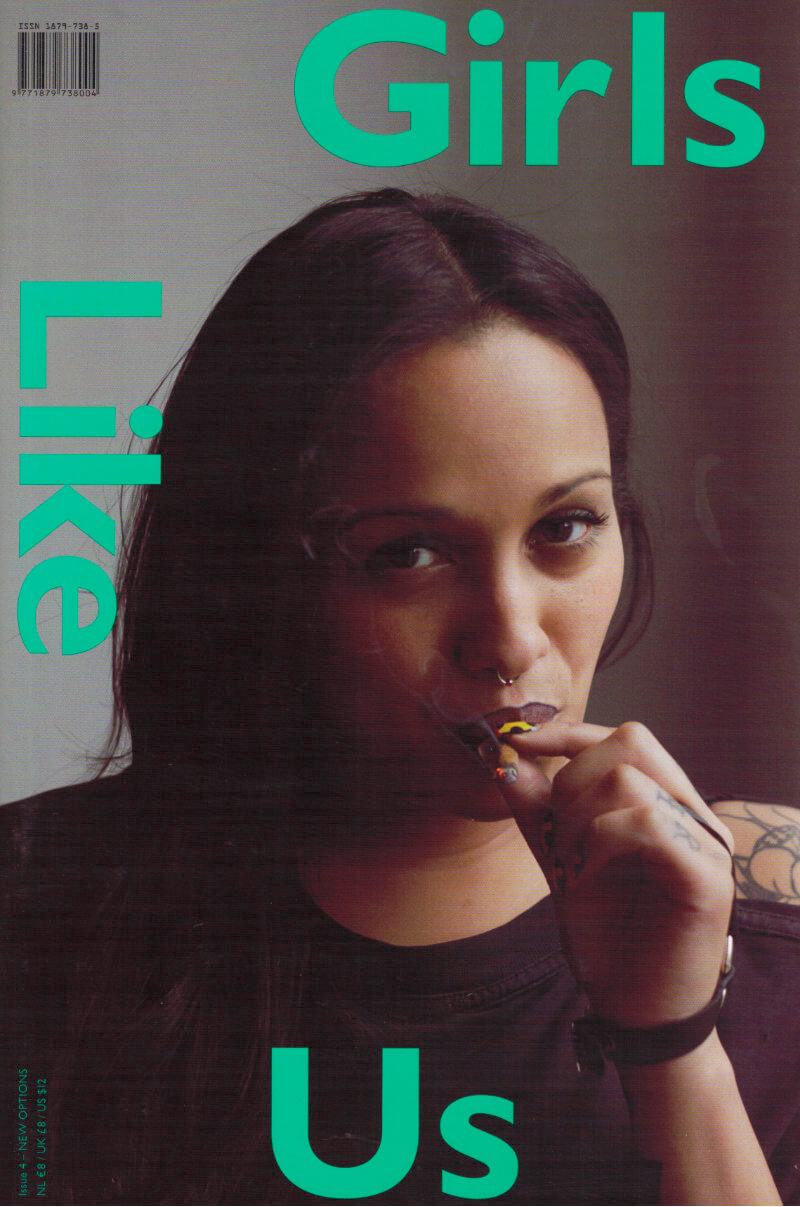
Girls Like Us #4 - New Options
Jessica Geysel, Sara Kaaman and 2 more
These days, if you call someone to go for a drink or a walk in the park, the obvious answer is: 'Sorry, I'm too busy'. Too busy with what? What do you do all day in your studio or office, bar or dancefloor, spending precious time on 'work'? And what makes it different from labouring? Do we slave for money – or no money – building on a system that is doomed to collapse? Or do we build on a new future where work and play are equal? When we work on our own initiatives and with a self-generated goal, would that still be called work? In this issue: other voices, other routes.
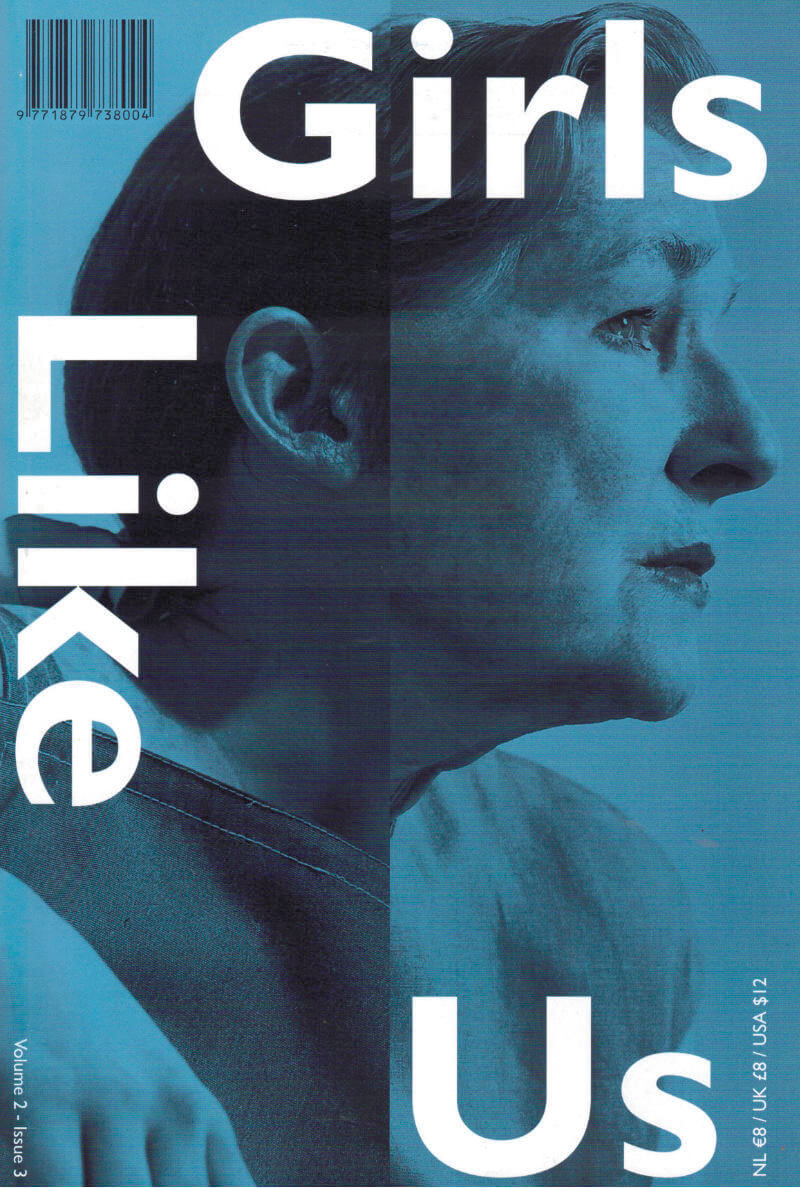
Girls Like Us #3 - Generations
Marnie Slater, Katja Mater and 2 more
Featuring Alice Carey, Anna Franceschini, Lizzie Fitch, Devin Blair, Kim Gordon, Annika Henderson, Melanie Bonajo, Marie Branellec, Elizabeth Orr, Holli Smith, Joke Robaard Litia Perta and Marie Karlberg.
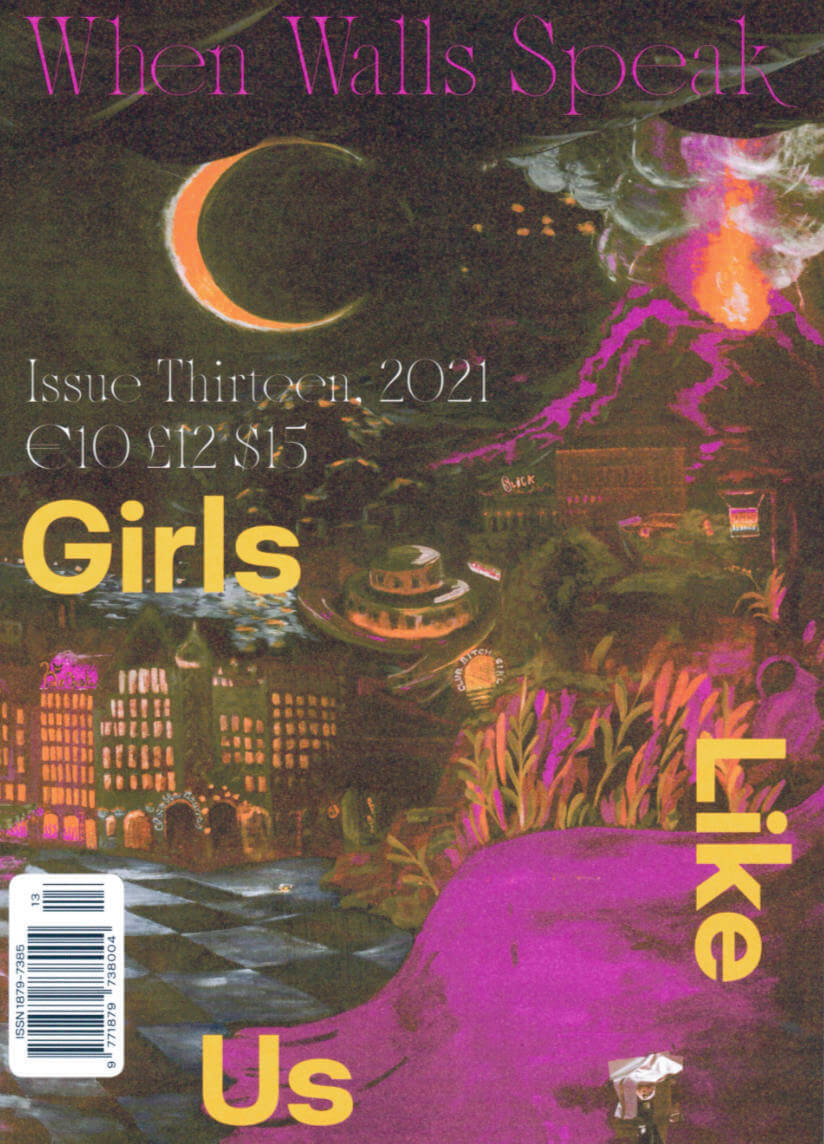
Girls Like Us #13 - The Club Scene
There can never be enough queer spaces, and the club is as good a place as any to begin an exploration. For generations, the club has been a space of legend, gossip, hearsay, and queer history, a place to gather and build community, to feel safe and experiment. The editors of ‘Girls Like Us’ decided to make a guest-edited issue centred around queer architecture back in 2019, long before the pandemic hit. They found the Swedish queer art and architecture collective MYCKET to fill this role, and later also realised how much club spaces were missed in pandemic times. Because, missing clubbing is one thing, but not being able to dance is something else entirely.
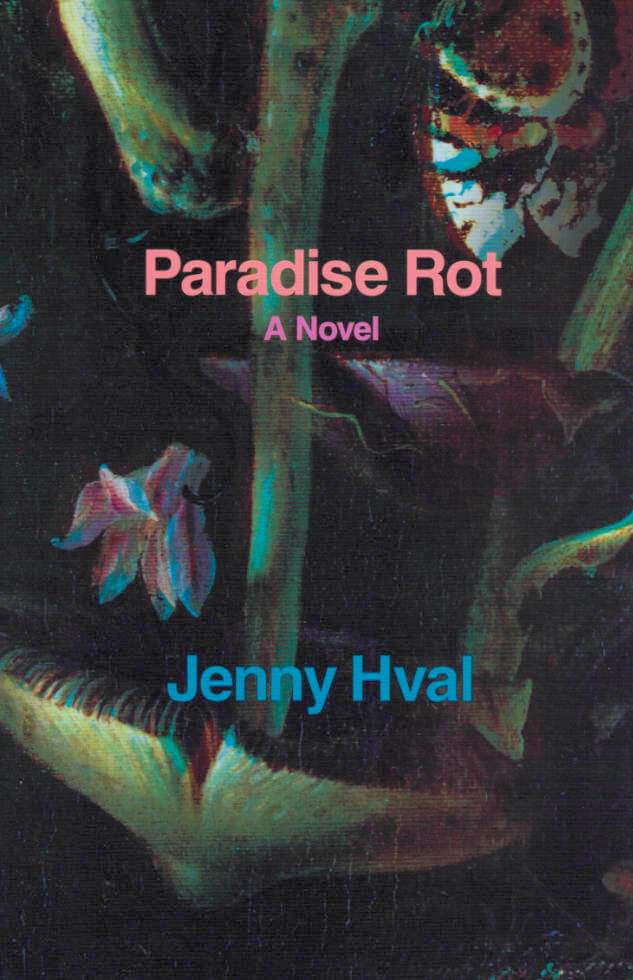
Paradise Rot
A lyrical debut novel from a musician and artist renowned for her sharp sexual and political imagery.
Jo is in a strange new country for university and having a more peculiar time than most. In a house with no walls, shared with a woman who has no boundaries, she finds her strange home coming to life in unimaginable ways. Jo's sensitivity and all her senses become increasingly heightened and fraught, as the lines between bodies and plants, dreaming and wakefulness, blur and mesh.
This debut novel from critically acclaimed artist and musician Jenny Hval presents a heady and hyper-sensual portrayal of sexual awakening and queer desire.
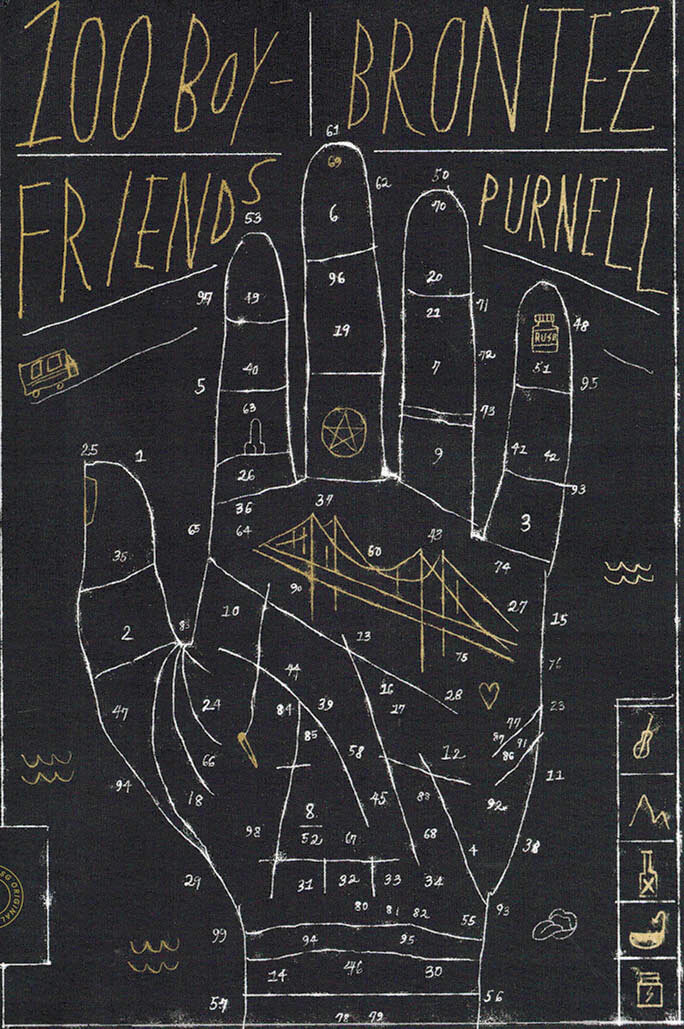
100 Boyfriends
Transgressive, foulmouthed, and brutally funny, Brontez Purnell's 100 Boyfriends is a revelatory spiral into the imperfect lives of queer men desperately fighting the urge to self-sabotage. As they tiptoe through minefields of romantic, substance-fueled misadventure, from dirty warehouses and gentrified bars in Oakland to desolate farm towns in Alabama, Purnell's characters strive for belonging in a world that dismisses them for being Black, broke, and queer. In spite of it, or perhaps because of it, they shine.
"Brontez Purnell has such seemingly casual genius that at times you forget you're reading a book and are transported to some couch/bus/basement where the drugs are really good and your friend is really funny, maybe your weird closeted cousin is on HarlemHookups in the corner, and all of a sudden your friend says some fucking Sappho ass, weird ass, brilliant ass bullshit. I love this slut of a book, it's a slut ass maker. 100 Boyfriends or no new boyfriends at all, Purnell's autofiction/memoir/whatever the hell this marvelously sad and intoxicating book is shook me up good with its honesty and blunt-to-face endings, the jokes and stories I didn't know we were allowed to tell outside of circles of faggots and misfits. But this book is in those circles, makes you tea and steals for you, it invites us in, but would we mind shutting the hell up cause it's a little hungover? The light is coming through the windows so clear." — Danez Smith, author of Homie
Brontez Purnell is a writer, musician, dancer, filmmaker, and performance artist. He is the author of a graphic novel, a novella, a children's book, and the novel Since I Laid My Burden Down. The recipient of a 2018 Whiting Writers' Award for Fiction, he was named one of the thirty-two Black Male Writers of Our Time by T: The New York Times Style Magazine in 2018. Purnell is also the frontman for the band the Younger Lovers, a cofounder of the experimental dance group the Brontez Purnell Dance Company, the creator of the renowned cult zine Fag School, and the director of several short films, music videos, and the documentary Unstoppable Feat: The Dances of Ed Mock.
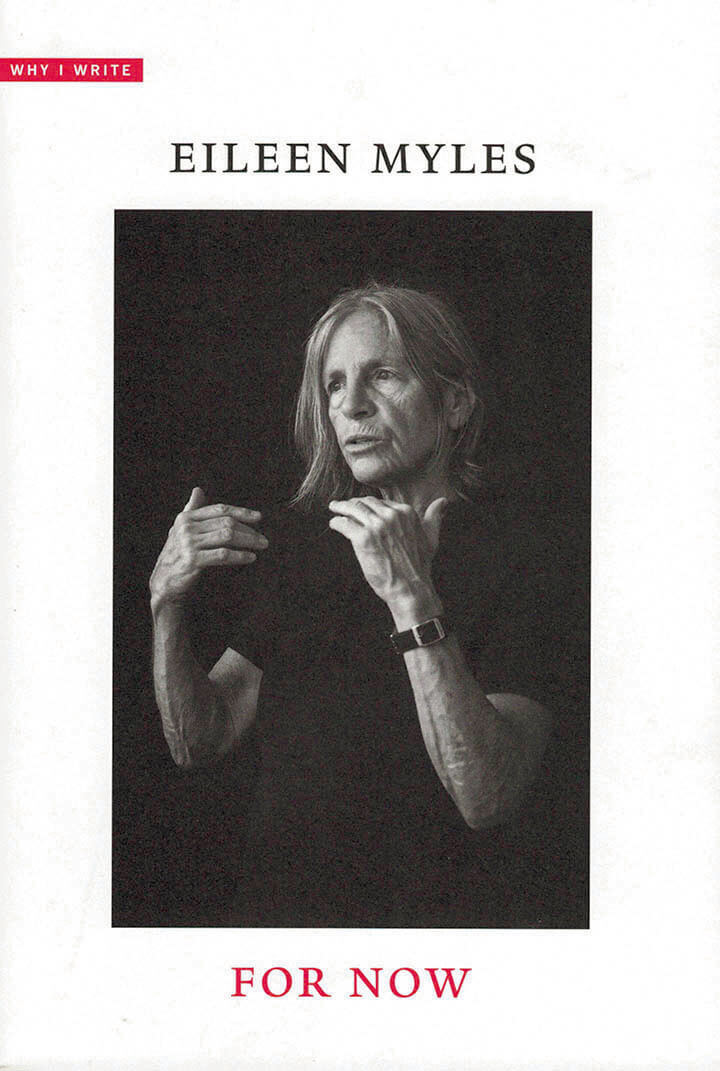
For Now
In this third Why I Write volume, Eileen Myles addresses the social, political, and aesthetic conditions that shape their work.
In this raucous meditation, Eileen Myles offers an intimate glimpse into creativity's immediacy. With erudition and wit, Myles recounts their early years as an awakening writer; existential struggles with landlords; storied moments with neighbors, friends, and lovers; and the textures and identities of cities and the country that reveal the nature of writing as presence in time.
For Myles, time's "optic quality" is what enables writing in the first place, as attention, as devotion, as excess. It is this chronologized vision that enables the writer to love the world as it presently is, lending love a linguistic permanence amid social and political systems that threaten to eradicate it. Irreverent, generous, and always insightful, For Now is a candid record of the creative process from one of our most beloved artists.
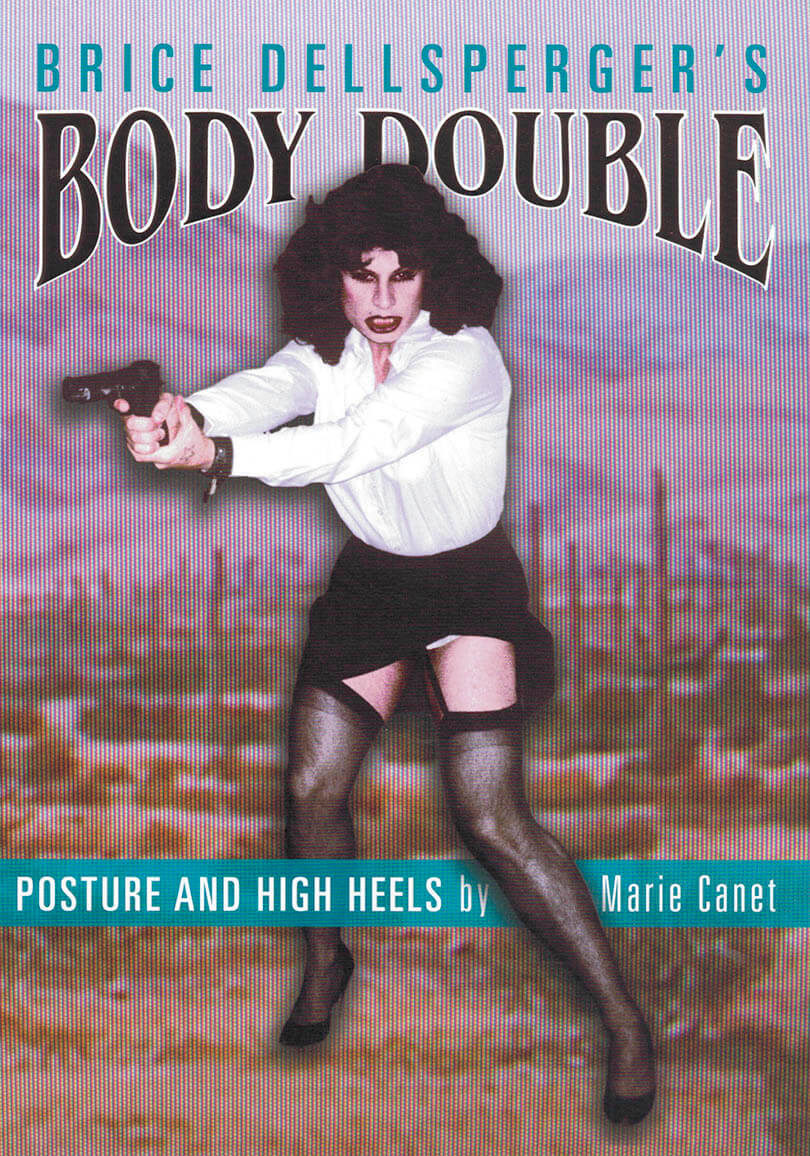
Body Double
Artist's book (an hallucinated portrait gallery of most of the characters created by Brice Dellsperger for his film remakes) / first substantive study of his work, with an essay by Marie Canet.
Brice Dellsperger's Body Double is the first monograph ever published on the artist's already cult film productions, with a long essay by art historian Marie Canet that addresses filmic remake, but also issues of models, gender politics, and representational chaos. Consisting in a large body of unpublished images, the book also invites the reader backstage—as in Kenneth Anger's Hollywood Babylon, after which this book is modeled—into the Dellspergian camp film factory, to get a closer look at the characters and personas that populate the Body Double series, and that are creations both of the artist and of his main performer and muse, Jean-Luc Verna.
Brice Dellsperger (born 1972 in Cannes, France, lives and works in Paris) pushes the boundaries of genre and gender. In his multifaceted reprises of iconic film sequences—all assembled under the generic title Body Double—the cineast and artist reenacts the selected scenes frame for frame and lets his “body doubles” perform all of the roles, be they male or female.
Brice Dellsperger has exhibited extensively in Europe and abroad, and began his well-known Body Double series in 1995. His work is in collections that include the Museum of Modern Art, Musée d'Art Moderne – Centre Pompidou, and the Nouveau Musée National de Monaco.
Available in French edition.

Blackspace: On the Poetics of an Afrofuture
Black artists of the avant-garde have always defined the future.
Blackspace: On the Poetics of an Afrofuture is the culmination of six years of multidisciplinary research by trans poet and curator Anaïs Duplan about the aesthetic strategies used by experimental artists of color since the 1960s to pursue liberatory possibility. Through a series of lyric essays, interviews with contemporary artists and writers of color, and ekphrastic poetry, Duplan deconstructs how creative people frame their relationships to the word, "liberation." With a focus on creatives who use digital media and language-as-technology, luminaries like Actress, Juliana Huxtable, Lawrence Andrews, Tony Cokes, Sondra Perry, and Nathaniel Mackey, Duplan offers three lenses for thinking about liberation: the personal, the social, and the existential. Arguing that true freedom is impossible without considering all three, the book culminates with a personal essay meditating on the author's own journey of gender transition while writing the book.
Anaïs Duplan is a trans* poet, curator, and artist. He is the founding curator for the Center for Afrofuturist Studies, an artist residency program for artists of color, based in Iowa City. He has worked as an adjunct poetry professor at the University of Iowa, Columbia University, Sarah Lawrence, and St. Joseph's College. He was a 2017-2019 joint Public Programs Fellow at the Museum of Modern Art and the Studio Museum in Harlem.
Published Oct 2020

Homie
Homie is Danez Smith’s magnificent anthem about the saving grace of friendship. Rooted in the loss of one of Smith’s close friends, this book comes out of the search for joy and intimacy within a nation where both can seem scarce and getting scarcer. In poems of rare power and generosity, Smith acknowledges that in a country overrun by violence, xenophobia, and disparity, and in a body defined by race, queerness, and diagnosis, it can be hard to survive, even harder to remember reasons for living. But then the phone lights up, or a shout comes up to the window, and family—blood and chosen—arrives with just the right food and some redemption.
Part friendship diary, part bright elegy, part war cry, Homie is the exuberant new book written for Danez and for Danez’s friends and for you and for yours.
& colin kaepernick is my president, who kneels on the air
bent toward a branch, throwing apples down to the children
& vets & rihanna is my president, walking out of global summitswith wine glass in hand, our taxes returned in goldto dust our faces into coins
& my mama is my president, her grace stuntson amazing, brown hands breaking brown bread overmouths of the hungry until there are none unfed & my grandma is my president
& her cabinet is her cabinetcause she knows to trust what the pan knowshow the skillet wins the war
—from “my president”
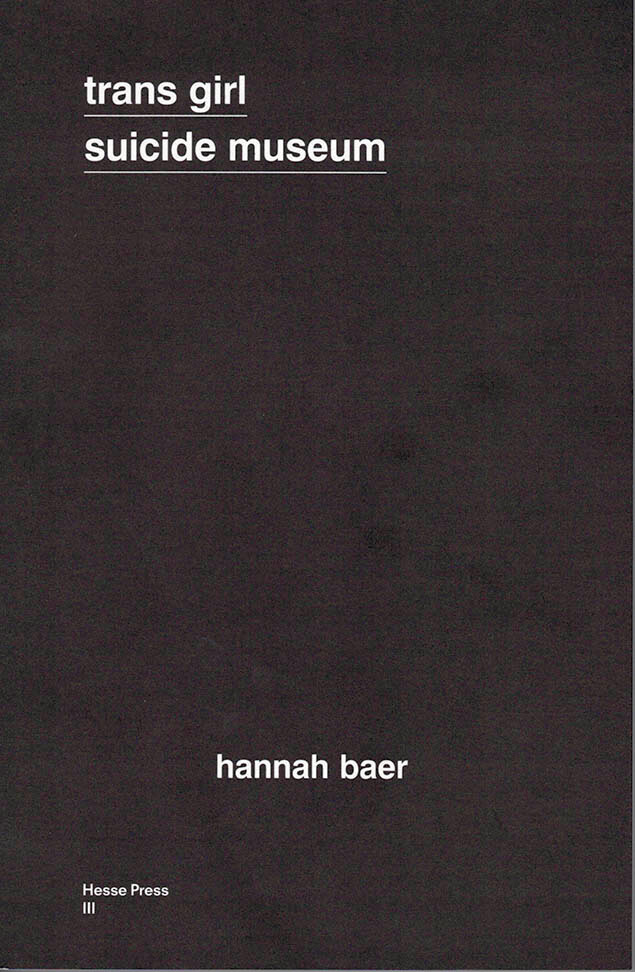
Trans Girl Suicide Museum
One part ketamine spiral, one part confessional travelogue from the edge of gender, TGSM is a hallucinatory transmission on sex, identity, the internet, and the flickering wish not to exist in a given body at a given point in time. TGSM raises questions with which we have begun to negotiate broadly as a culture: what is actually happening to someone when they transition? how should we understand or describe such processes? what is the role of drugs, of hallucination, of imagination, in transition? is being a trans person in this moment in history, when the identity is ever more carefully traced [and tracked] by larger cultural forces, more liberated than before?
Drawing its source material from chance encounters, wordless interactions in basements or bathrooms or hotel rooms, to archives of 20th century critical theory, sleepover secrets exchanged between old friends, rhetorical barbs deployed in the classrooms of elite universities, arguments on the phone with your parents across timezones, the nonverbal codes of high and low fashion, and scribbled notes on the backs of receipts for medicines you don't know how they work, TGSM is a morbid yet strangely hopeful meditation on the possibilities and meanings of gender variation in our time.
Hannah Baer runs the meme account @malefragility on instagram, and studies clinical psychology in new york city.